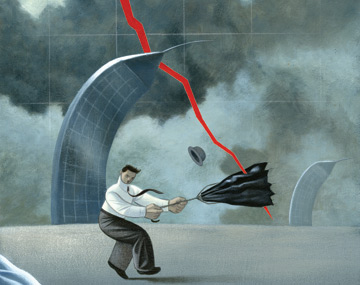
(2 of 2)
Because most of the people at the World Economic Forum aren't Americans, much of the discussion at Davos centered around whether the rest of the world will be able to breeze along despite the U.S. slowdown. The past five years have been mixed ones for the U.S. economy: growth, sure, but lots of angst and increasing inequality (to say nothing of all that increased debt). But for the rest of the world — especially the emerging economies of Asia, Africa and Latin America — that half-decade has been the best run in memory. India and China, the new economic giants, are posting astonishing growth numbers, while economies from Africa to Latin America that depend on the export of primary goods have benefited from high commodity prices — themselves a function of the Asian giants' performance.
So far, actual signs of slowdown outside the U.S. and Europe are few, though China's economy, especially, is closely tied to the health of an American market in which it can sell its exports. The U.S. economy is over three times the combined size of India and China, suggesting that the world will (in a familiar Davos phrase) catch a cold if Uncle Sam sneezes. Europe, despite having seen a couple of decent years, exhibits — Roubini pointed out — some of the same warning signs as the U.S. in overvalued assets such as housing. "Europe is not going to get special dispensation from a global slowdown," said Roach. But some Asians thought their economies' performance was sustainable — and might help ease the global pain. "The economic bleakness in the West I don't think is matched by economic bleakness in the East," said Kamal Nath, India's Minister of Commerce and Industry, at the Board of Economists. There's so much growth momentum outside the U.S., argued C. Fred Bergsten, head of the Peterson Institute for International Economics in Washington, that "a global recession is inconceivable."
But what if it isn't? For those outside the U.S., the answer is evident. Recessions are bad. A special concern in poorer countries, says Ngozi Okonjo-Iweala, the former Finance Minister of Nigeria, who is now a managing director of the World Bank, is that food prices are being driven up — partly by demand for biofuels, which is leading to the substitution of food crops with ones that can produce fuel. If food stays expensive while economies in Africa and elsewhere slow, there could be big trouble. "The better-off countries have safety nets," said Okonjo-Iweala. Her plain implication: the poorer ones do not.
For Americans, it makes a big difference how much the rest of the world slows down. If the global economy were to keep chugging along, the upshot for the U.S. would be continued high energy prices as Asia's demand for oil soars; a dollar slump as low interest rates make it less attractive to hold dollar-denominated securities; and the threat of rising inflation as a weak dollar makes imports more expensive. On the other hand, exporters would benefit, though exports account for only 12% of the U.S. economy. A global slowdown (but not a recession) would give the Fed more room to maneuver without the threat of stoking inflation. But an actual global recession (generally defined as annual gdp growth of less than 2.5% — since the Depression, global growth hasn't actually gone backward) would be just plain bad news.
Over the next few years, it will become clear, some people, institutions and countries will weather a slowdown much better than others. In the U.S., millions of people can't afford their mortgages, but most homeowners don't have such worries. Many emerging-market economies that were buffeted by financial crises in the late 1990s are now in excellent financial shape; the U.S., with its trade deficit and federal budget deficit, may be more vulnerable.
Then there are the corporations. Many CEOs roaming the hallways of the convention center in Davos seemed strikingly optimistic. Of course, you might say they are paid to be that way, at least in public. But it is undeniably true that many of them did much to reduce their debt and otherwise clean up their finances during the stock-market bust earlier this decade. And many are still seeing good business conditions. The hits corporations' stocks are taking, in other words, do not match their assessment of the markets for their products.
"The core underlying demand … continues to grow," said Randall Stephenson, the CEO of AT&T. "We don't see that changing even in a recessionary environment." One executive making the rounds of the gloomy panel discussions at Davos wondered if the negative talk might be the biggest problem. "I'm unhappy about how we're talking ourselves into a recession," said Lee A. McIntire, president of CH2M HILL, an engineering and construction company based in Colorado. "We're all doing that." And in economics — always subject to a herd instinct — what people say will happen has a nasty chance of turning out to be true.